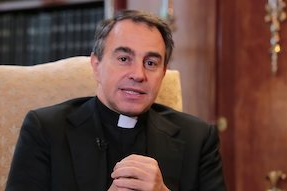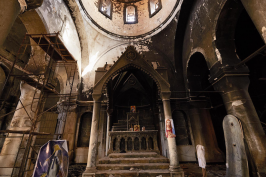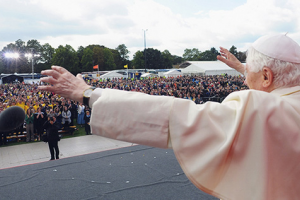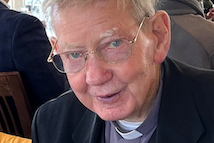Papal Visit (viii) Ecumenical Vespers at Westminster Abbey
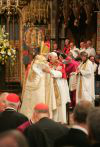
Archbishop of Canterbury greets Pope
At 7pm on Friday, the Pope arrived at Westminster Abbey where he took part in an ecumenical celebration of Vespers. Accompanied by Anglican Archbishop Rowan Williams of Canterbury, and Catholic Archbishop Vincent Nichols of Westminster, Pope Benedict was received by John Hall, dean of the abbey, who introduced him to the chapter. Together they looked briefly at the statues of the 'modern martyrs', including Oscar Romero, visited the tomb of the Unknown Soldier and said a prayer for peace to mark the 70th anniversary of the Battle of Britain. The Pope was then introduced to a number of religious leaders in the abbey's St George's Chapel.
The Holy Father, accompanied by the Archbishop of Canterbury, then made his way to the altar of the coronation where after being greeted by the archbishop and the dean, he said:
"I thank you for your gracious welcome. This noble edifice evokes England's long history, so deeply marked by the preaching of the Gospel and the Christian culture to which it gave birth. I come here today as a pilgrim from Rome, to pray before the tomb of St. Edward the Confessor and to join you in imploring the gift of Christian unity. May these moments of prayer and friendship confirm us in love for Jesus Christ, our Lord and Saviour, and in common witness to the enduring power of the Gospel to illumine the future of this great nation".
After praying Vespers, Benedict XVI delivered the following address:
"I thank the Lord for this opportunity to join you, the representatives of the Christian confessions present in Great Britain, in this magnificent abbey church dedicated to St. Peter, whose architecture and history speak so eloquently of our common heritage of faith. Here we cannot help but be reminded of how greatly the Christian faith shaped the unity and culture of Europe and the heart and spirit of the English people. Here too, we are forcibly reminded that what we share, in Christ, is greater than what continues to divide us".
The Holy Father recalled how this year marks the centenary of the modern ecumenical movement which "began with the Edinburgh Conference's appeal for Christian unity as the prerequisite for a credible and convincing witness to the Gospel in our time. In commemorating this anniversary, we must give thanks for the remarkable progress made towards this noble goal through the efforts of committed Christians of every denomination. At the same time, however, we remain conscious of how much yet remains to be done. In a world marked by growing interdependence and solidarity, we are challenged to proclaim with renewed conviction the reality of our
reconciliation and liberation in Christ, and to propose the truth of the Gospel as the key to authentic and integral human development".
"Our commitment to Christian unity is born of nothing less than our faith in Christ. ... It is the reality of Christ's person, His saving work and above all the historical fact of His resurrection, which is the content of the apostolic 'kerygma' and those credal formulas which, beginning in the New Testament itself, have guaranteed the integrity of its transmission. The Church's unity, in a word, can never be other than a unity in the apostolic faith, in the faith entrusted to each new member of the Body of Christ during the rite of Baptism. It is this faith which unites us to the Lord".
"We are all aware of the challenges, the blessings, the disappointments and the signs of hope which have marked our ecumenical journey. ... We know that the friendships we have forged, the dialogue which we have begun and the hope which guides us will provide strength and direction as we persevere on our common journey. At the same time, with evangelical realism, we must also recognise the challenges which confront us, not only along the path of Christian unity, but also in our task of proclaiming Christ in our day.
"Fidelity to the Word of God, precisely because it is a true Word, demands of us an obedience which leads us together to a deeper understanding of the Lord's will, an obedience which must be free of intellectual conformism or facile accommodation to the spirit of the age".
"Gathered in this ancient monastic church, we can recall the example of a great Englishman and churchman whom we honour in common: St Bede the Venerable. At the dawn of a new age in the life of society and of the Church, Bede understood both the importance of fidelity to the word of God as transmitted by the apostolic tradition, and the need for creative openness to new developments and to the demands of a sound implantation of the Gospel in contemporary language and culture".
"May St Bede's example inspire the Christians of these lands to rediscover their shared legacy, to strengthen what they have in common, and to continue their efforts to grow in friendship. May the Risen Lord strengthen our efforts to mend the ruptures of the past and to meet the challenges of the present with hope in the future".
See also: Reflections on Pope Benedict at Westminster Abbey www.indcatholicnews.com/news.php?viewStory=16754
Source: ICN /VIS



